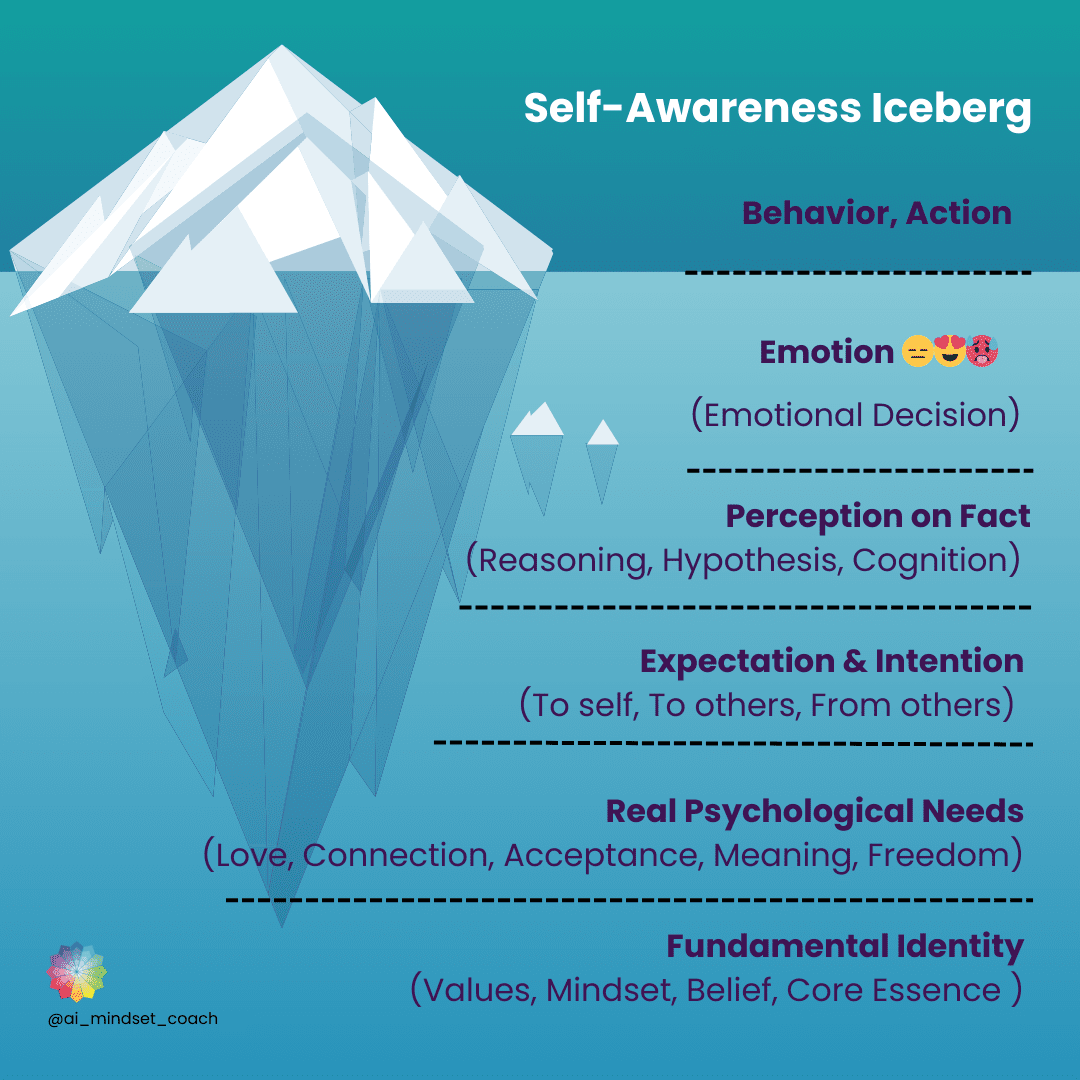The essence of love between a couple lies in the profound understanding that goes beyond surface appearances. It involves seeing not just what is on the surface but also delving into the psychological needs and underlying reasons behind each other's actions. This understanding allows for a heartfelt comprehension and the provision of the emotional nourishment that is required.
The Iceberg Theory
It is an incredible tool for gaining profound self-awareness and insight into the inner worlds of others. It plays a significant role in our interpersonal relationships.

Imagine a person's "self" as a massive iceberg. What we can see is just the tip of the iceberg—the surface, which represents their behaviors and responses. Hidden beneath the surface is a much larger iceberg, their "inner world," which has been suppressed and overlooked over the long term.
By unveiling the secrets of this iceberg, we can discover the desires, expectations, perspectives, and feelings that shape our lives and reveal our true selves. According to this theory, in our interactions with others, we need to explore the inner iceberg beneath our own or others' surface behaviors to find solutions to problems.
Everyone has their own iceberg, and recognizing these inner depths can greatly improve our relationships.
Layers of the Iceberg Theory
-
Behavior: Behavior is often the only visible part of the iceberg, representing how people act and respond to the outside world.
-
Response Style: It's how we choose to react or respond to external situations.
In conflicts, people often have four response styles: blame, appease, be overly rational, or deflect.
-
Feelings: Feelings are universal human emotional experiences, such as love, anger, or fear. The factors triggering these feelings vary among individuals, families, or cultures.
"All living beings have feelings, but humans have the most."
Humans are inherently emotionally rich, and respecting someone means accepting all their true emotions, not just selectively.
Emotions are neutral, with both positive and negative aspects. Emotions are a manifestation of energy, so controlling emotions is not ideal; accepting and transforming them is.
-
Perspectives: Perspectives are based on a combination of present and past experiences, not just on the facts of the moment.
Different people can have different feelings and thoughts about the same event. Perspectives are cognitive constructs in our minds, representing our beliefs, rules, values, and more.
-
Expectations: Expectations of ourselves and others arise from desires. Desires are universal, but expectations vary among individuals.
The text delves into the transference and projection behind expectations.
-
Needs: Desire is a universal human need—everyone, regardless of race, culture, religion, gender, or skin color, wants to be loved, valued, and accepted.
From the moment of birth, infants desire love, and this continues throughout life.
When desires go unmet, communication with others becomes difficult or strained.
-
Identity: At the core or foundation of the iceberg lies self-worth, often the most challenging aspect to perceive and understand.
It represents one's self-evaluation—"Who am I?"—and is the source of vitality.
Our goal is to discover our true selves, nurture this part continually, and fill our inner world with joy and contentment.
Human interactions are like collisions between two icebergs.
Example Exploration of the Iceberg
Every event has an associated iceberg. When an event occurs, the experiences at various levels behind our behaviors are simultaneous. However, when exploring the iceberg, it's helpful to start by examining each layer one by one.
With practice, you can explore the layers systematically and holistically, even treating each layer as its own iceberg.
For example, when a wife gets angry at her husband for leaving dirty socks lying around, what does her iceberg look like?
- Behavior: Seeing dirty socks left scattered.
- Response Style: Blaming the husband for leaving socks everywhere.
- Feelings: Helplessness, anger.
- Deeper Feelings: Feeling wronged, disappointed, helpless, powerless.
- Perspectives: Believing things shouldn't be left lying around; he should take responsibility for his actions. "I've told him so many times, and he doesn't change. He doesn't care about me. I have to clean up every day, and it's exhausting. He doesn't value me."
- Expectations: Expecting him to listen to her, do as she says, be self-sufficient, and care for her.
- Needs: Desiring respect (compliance with her requests), recognition (acknowledgment of her effort), and love (valuing her and showing empathy).
- Identity: Low self-worth ("I'm a failure as a woman").
When the wife understands her own iceberg, she can reflect:
"Why do I get so angry? Is it just because of the socks being left around, or do I want to control him to prove he values and respects me? Why must I insist he have the same cleanliness habits as me? Does leaving things around equate to incompetence and a lack of understanding of my struggles? Can I respect someone who is different from me?" With these insights, her emotions become calmer.
Transforming the Iceberg
The beauty of the Iceberg Theory lies in the fact that even if nothing external changes, we can change ourselves significantly through awareness and transformation.
Three principles of transformation:
It's about how things happen, not what happens
In our life, different events happen. But we tend to solve them in similar ways and expecting different results. We need to change the unconscious patterns.
Stop Fighting with Old patterns, introduce new patterns
Fighting with the old patterns is like struggling in darkness. But we only need a new light in the dark. Instead of fighting to change the old pattern, why not introducing new perfection, desire and feelings into your being?
When we can look at ourselves from a higher viewpoint to choose new patterns, the new patterns replaces the old ones.
Freedom is choice, and choice is responsibility
What ever action, behavior, feeling, thoughts, expectations and desire, are our own choices.
Our choices are our freedom.
And because it is our freedom of choice, we should be responsible for them.
We should have ownership of our choices.
Transforming the Iceberg in Practice
Lily had hoped that her husband would pay attention to Valentine's Day and make it a romantic festival for them. However, on Valentine's Day, while all her colleagues at the office received flowers, her husband didn't mention anything. Lily felt disappointed and angry. If Lily ignores her husband's "iceberg" and remains unaware of her own "iceberg," what might happen next? Many of us are familiar with this scenario:
Lily returned home feeling aggrieved and angry, and her husband noticed her discontent. To avoid conflict, he chose to remain silent. This silence led to further frustration, and Lily eventually burst out, complaining that her husband didn't love her. Her husband found her reaction inexplicable.
The situation escalated as the wife's anger grew, and she began to question the necessity of her husband's presence in her life. She wondered why she shouldn't leave if he didn't care about her. Two people endured their time together in an extremely unhappy atmosphere, and on Valentine's Day, their relationship seemed to drift further apart.
But how can one detect and transform these icebergs? It begins with awareness of your inner emotions. After taking time to calm the conflicting voices within yourself, you recognize your desire for a romantic Valentine's Day and your longing for a deep emotional connection with your husband. You acknowledge that these emotions and expectations belong to you.
You also acknowledge the iceberg within your husband. Even though he may not express emotions openly, he believes that his hard work shows his love for the family. His native family culture may not place much importance on rituals like celebrating Valentine's Day. So, you decide to take full responsibility for your expectations and personally plan this romantic festival.
You call your husband and express your hopes for Valentine's Day—flowers and quality time together. You discuss whether you should dine at home or go out. Then, you call your father-in-law or mother-in-law to arrange for babysitting.
Now, how can these two "icebergs" coexist harmoniously and dance together? After making the necessary arrangements, you return home with joy. You enjoy a candlelight dinner with your husband and, after a couple of glasses of wine, open your heart:
"Honey, when I received those flowers, it made me so happy! I felt like I was falling in love all over again. I know you may not place as much importance on these holiday rituals, but I see your hard work and dedication to our family. You are the backbone of our family, and even though you don't always say it, I can see how much you care. I hope that even with our busy lives and the kids, we can find time for each other like we did today. It means a lot to me, and you're such an important person in my life. I hope we can keep this love alive."
This kind of communication allows both parties to feel sincere, accepted, and nourished. It fosters a sense of love and respect in the relationship. Imagine how you would feel if your partner spoke to you like this—sincerely and openly discussing your relationship. Would you feel touched, supported, respected, and loved?
However, this method may not be easy for everyone. Some might wonder if they are willing to do it or if they can overcome the inner resistance. It involves personal self-worth and the emotional baggage we've accumulated over the years. Can we face our inner vulnerabilities and fears with the strength of our self-worth?
To make this change, we must enrich our inner "psychological nutrition." A strong mind allows us to face our fears without hesitation, and by calmly confronting them, we can transcend them. Change is possible, but it's not always easy. As long as we continue to learn and grow, change will happen.




